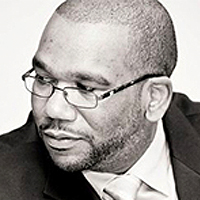Cedric Tolliver
|
Cedric Tolliver, assistant professor of English, has been awarded the 2013-2014 Fulbright Visiting Research Chair at McGill University in Montreal, Canada. During his year at McGill, Dr. Tolliver will continue his research on the lives and work of African-American literary and cultural figures during the early parts of the Cold War era. The Fulbright award and time in Canada will assist Prof. Tolliver as he delves further in to the research questions that interest him as a part of his book project. “Canada figures into African-American history in a large way,” said Dr. Tolliver. “Canada was a first step in an international journey for several African-American literary figures. For example, Richard Wright, an African-American author, went to Canada before moving to France and becoming an American expatriate.” Dr. Tolliver also is studying the Canada connections of Paul Robeson, the athlete, singer and actor whose outspoken political views caused him to be blacklisted during the McCarthy era, a period in the 1950s when U.S. Senator Joseph McCarthy zealously pursued an anti-Communism political agenda that targeted Americans of all ethnicities that he suspected of treason and disloyalty to the United States. “Politically, one of the things Robeson was committed to was the working class,” said Dr. Tolliver. “In 1952, Robeson was invited to sing at an international mine workers conference being held in British Columbia, Canada. At the time Americans didn’t need a passport to travel to Canada. “However, the United States government would not allow him to go. So he held a concert and gave a speech just across the border in Washington State with speakers loud enough to be heard in Canada.” That concert became the first of four Robeson concerts held on the U.S./Canadian border. Other African-American artists also were drawn into the politics of the time defined largely by the political, economic and military rivalry between the United States and Soviet Union. “The Soviet Union was using the racial discourse in America as propaganda to recruit international allies,” said Dr. Tolliver. “The United States had to address the fact that there was racial discrimination in America to a global audience.” Dr. Tolliver’s research will be integrated into his manuscript, Of Vagabonds and Fellow Travelers: African Diasporic Cosmopolitan Culture and the Cold War. In addition to his research, Dr. Tolliver will teach one advanced course in African-American literature and he will play a central role in an African American Studies reading and research group while at McGill. |
 |